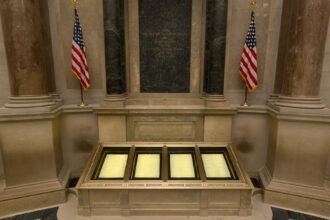Famously, when asked after the Constitutional Convention in 1787 what kind of government had been decided upon, Benjamin Franklin responded: “A Republic, if you can keep it.” With those words, Franklin recognized that a republic, a representative democracy, was a perilous undertaking and that its survival was not guaranteed. Abraham Lincoln said it even more explicitly in 1838: “If destruction be our lot, we must ourselves be its author and finisher. As a nation of freemen, we must live through all time, or die by suicide.” Later, Ronald Reagan warned that “freedom is never more than one generation away from extinction.”
Always the optimist, Reagan loved to describe America as a ‘shining city upon a hill’, ‘a tall, proud city built on rocks stronger than oceans, wind-swept, God-blessed, and teeming with people of all kinds living in harmony and peace; a city with free ports that hummed with commerce and creativity.’ (see video below). Yet, paradoxically, Reagan also coined the campaign slogan ‘Make America Great Again’. While the first sentiment implies that the American experiment has been successfully completed, the second suggests he opposite; although once great, America has to be made great once more. So which one is it?
America under construction
The term ‘experiment’ in its scientific meaning implies that at one point the experiment is over, and that conclusions can be drawn. Already in 1837, President Andrew Jackson bade farewell to the Presidency by stating that “our Constitution is no longer a doubtful experiment, and at the end of nearly half a century we find that it has preserved unimpaired the liberties of the people, secured the rights of property, and that our country has improved and is flourishing beyond any former example in the history of nations.”
At the same time, the narrative of America as an ‘experiment’ conveys the notion that America is not finished; that its founding premises can be subject to scrutiny, and can be intermittently altered to produce a better outcome. In other words, experimenting with governance can never be truly finished. This image of the ‘city on a hill’ is much closer to how the Puritan immigrant John Winthrop used it as he and his fellow Puritans made their way to what would become Massachusetts in 1630. In his view, which he borrowed from the bible, the ‘city on a hill’ metaphor meant that the eyes of the world were upon the Puritans as they constructed a new colony, a new society, and a new government, and that they better do a good job. From this perspective, the Great American Experiment is the development of that city on a hill so that one day it might shine.
This idea of America as an experiment, as something that is still under construction, comes closer to what the Constitution of 1789 says and how Abraham Lincoln perceived it in 1863. The Constitution speaks of forming ‘a more perfect Union’ between the states and its peoples, suggesting that the new nation that was being founded was not going to be perfect, and there was still work to be done. Abraham Lincoln in his famous Gettysburg Address posited that the purpose of the Constitution to form a more perfect Union is, “an ‘unfinished work”.

US Constitution in its encasement at the National Archives in Washington, DC
Two promises to America
That speech was also possibly the first time that a clear connection was being made between the Constitution and a more perfect Union, and the promises made in an earlier document, the Declaration of Independence of 1776. The two founding concepts of the Great Experiment can be readily found in that Declaration:
We hold these truths to be self-evident, that all men are created equal, that they are endowed by their Creator with certain unalienable Rights, that among these are Life, Liberty and the pursuit of Happiness.–That to secure these rights, Governments are instituted among Men, deriving their just powers from the consent of the governed, (…).
Thomas Jefferson, the enlightened yet slave holding aristocrat from Virginia who wrote the Declaration, thus made two promises, fully aware that they weren’t to be taken literally, and that they could not or would not be fulfilled. Jefferson’s first promise, the Promise of Equality, created the expectation that everybody in the newly independent colonies would be considered equal and treated as such. But slavery, being America’s Original Sin, and the country’s continuing struggle to fulfil this Promise of Equality is, to this day, America’s fate.
The second promise is based on the first. The Promise of the Consent of the Governed created the expectation that everybody could participate in a new model of government. But when independence was reached and the United States was founded with the ratification of the Constitution, this promise was not kept either. Those in power constructed a government based on a deep mistrust of the people and deliberately created a formal distance between citizens and the actual government. Even the promise of participation in public life through elections and voting was, for quite some time, reserved for the privileged few.
In the next installment we travel through American history to explore the struggle to fulfil the first promise, the Promise of Equality.
Kenneth Manusama is an international lawyer and America expert. He completed his studies at VU Amsterdam and taught at New York University and Amsterdam University College. Kenneth is a regular guest speaker at various Dutch media outlets and programs, and an expert on the US Constitution and legal aspect of American politics. He is also the host of the podcast Amerikaanse Toestanden and the author of Democratie van het Wilde Westen.
is an international lawyer and America expert. He completed his studies at VU Amsterdam and taught at New York University and Amsterdam University College. Kenneth is a regular guest speaker at various Dutch media outlets and programs, and an expert on the US Constitution and legal aspect of American politics. He is also the host of the podcast Amerikaanse Toestanden and the author of Democratie van het Wilde Westen.



